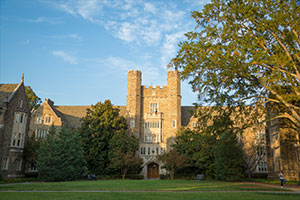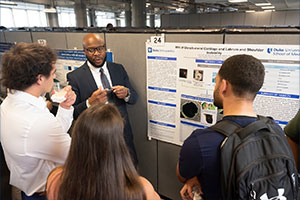We're pleased to offer physician-scientist research opportunities in collaboration with the Duke Office of Physician Scientist Development, Duke Medicine, and Duke Neurosurgery.
Physician-Scientist research track opportunities are available through the Duke Office of Physician-Scientist Development, Duke Medicine and Duke Neurosurgery:
- Duke Pathology residents may apply for the Duke Medicine R38 Research Pathway
- Residents and fellows interested in neuroscience may apply for the NIA R38 Alzheimer Disease grant and the Duke Neurosurgery R25 Research Pathway
- Residents and fellows may apply for postdoctoral T32 grants.
Duke Pathology residents match into the AP/CP program and may apply for a physician-scientist research pathway during PGY-1 or PGY-2. These pathways allow residents to pursue the American Board of Pathology Physician-Scientist Research Pathway track. Residents may switch into AP-only or AP/NP tracks if they are able to secure a grant. Resources and additional information are available through Duke Office of Physician-Scientist Development here. Learn about opportunities for residents that the office offers here.
R38 Research Pathway
The Department of Medicine offers the Duke R38 Research Pathway for residents committed to a career as a physician investigator. This NIH-funded, ABIM-approved opportunity allows the pathology resident to pursue AP/CP or AP-only training, and incorporates 18 months of protected time for research (6 months during residency, and 12 months after residency) sponsored by an R38 Stimulating Access to Research in Residency (StARR) grant.

Eligibility and selection process
Residents with commitment to either laboratory-based basic science research or clinical research are eligible. Interested applicants should contact program staff to schedule an initial meeting and learn about the required annual proposal process. Applications decisions will be made by the Vice-Chair for Research in the Department of Medicine, and other members of the R38 selection committee, contingent upon the Residency Director’s approval.
Selected residents appointed to the R38 research pathway will establish a track record of scholarly activities, including:
- Submission of an application for an external individual career development award (NRSA F32 or K38/StARRTs)
- Participation in scientific meetings
- Submission of research manuscripts to peer-reviewed journal
Benefits of the program include:
- 18 months of 80% protected time for research during the 36 or 48 month program
- An opportunity to apply for a technician or research assistant to maintain research productivity during the blocks of clinical residency training
- Increased attractiveness for Duke School of Medicine subspecialty fellowship programs
- Funds to support conference travel and research needs
- Eligibility to apply for a new NIH early career award (K38 Stimulating Access to Research in Residency Transition Scholar)
- Residents in this pathway will have a primary research mentor and a scholarship oversight committee to help residents create an individualized career development plan.
Find additional information about Duke R38 Research Pathway here.
For R38 Research Pathway questions contact: Scott Palmer, MD, Vice Chair for Research in the Department of Medicine, and Maria Price Rapoza, PhD, Executive Director for the Cardiovascular Research Center. Questions about the RFA should be referred to Maria Price Rapoza.
R25 Training Grants
Duke Neurosurgery has one of a small number of NIH-funded R25 training grants in the nation designed for neurosurgery, neurology, and neuropathology residents and fellows interested in neuroscience research. Application for renewal of this grant is in process.
Residents and fellows may learn more and apply for postdoctoral T32 grants on the Duke University School of Medicine’s Office of Physician-Scientist Development (OPSD) training program page here.
Learn more about the Office of Physician-Scientist Development (OPSD) | Duke University School of Medicine
Residency Program Elective Time
Apart from securing R38, T32, R25, and other grants, residents may use elective time during residency for research. A 5-month research block will include the following:

- Research Proposal - A research proposal must be submitted to the Education Committee. The proposal will include the name of the lab mentor, a detailed summary of the project, and the exact months the resident wishes to perform research. The proposal is subject to approval by the Education Committee.
- Normal Resident Duties - The resident on research elective will be required to uphold some of the normal resident duties including participation in service coverage, frozen section call, AP/CP call, holiday coverage, and vacation/sick day coverage for other residents, on an as-needed basis. Service coverage may be requested by the program director, the chief of service, and chief residents. Regular attendance at mandatory resident conferences, events, and residency recruitment activities. All service work must be finalized in accordance with the usual departmental policies.